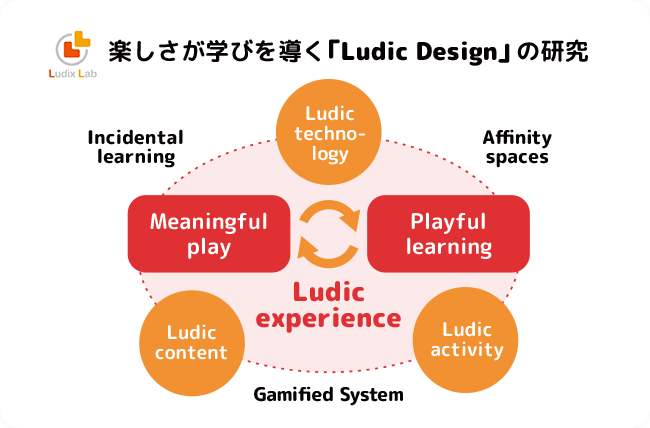-
 Ludix Lab @ UTokyo
Ludix Lab @ UTokyo
-
東京大学 大学院情報学環 藤本研究室
-

-

-

-
日本語 ENGLISH
post date and time: 2023-01-13 contributor: admin
Our Lab
At Ludix Lab, we are deeply committed to developing “Ludic Experiences” that foster genuine human learning and growth. Grounded in the fundamentals of educational technology and instructional systems design theory, Our research thoroughly explores the field of game-based learning methodologies. We work collaboratively to create effective design techniques, explore supportive strategies for online education, and produce learning content that thoughtfully incorporates elements of game-based learning.Our aim is to enrich and enhance the educational journey for learners everywhere.

Educational institutions today offers a full range of options and learning opportunities. However, learning is different for each individual, as each has different aptitude and motivations toward learning. Traditional teaching methods are not effective for everyone.
Our laboratory’s mission is to foster a society where everyone can enhance their lives through meaningful learning experiences. We strive to create diverse learning opportunities, make conventional educational settings more engaging, promote learning outside traditional environments, and develop and implement teaching methodologies that address emerging societal needs. Our core research theme is: ‘Developing a New Learning Environment for the Future’.”
Research Themes:
Currently, we are developing research projects mainly on the following research themes.
- Game learning methodology
Exploration of design methodologies that integrate “meaningful play” with “engaging learning.” This includes studies on gamification design methods within education, the creation of educational curricula incorporate game elements, and the development of tools to aid in the adoption of game-based learning. Development of educational programs for schools that harness gamification methods.
Examples of research results:
Fujimoto, T. (2015) Development and practice of a lesson design framework incorporating game elements. Transactions of the Japan Society for Educational Technology. Journal of Japan Society for Educational Technology. 38(4) 351-361.
Fujimoto, T. and Yamada, M. (2013) Current status and future development of evaluation on educational use of games in informal learning, Transactions of the Japan Society for Educational Technology. Journal of Japan Society for Educational Technology. 37(3). 343-351. Fujimoto, T. (2012) An introduction to game developer education using serious game development as a subject, Journal of Digital Game Studies, 5(2). pp. 53-58. 53-58.
- Game learning contents and technologies
Design and creation of instructional materials and learning systems tailored for game-based learning methods. Production of various game-based learning materials, such as digital game applications for mastering subjects like English and math, as well as card games designed for career education.
Examples of research results:
Fujimoto, T., Fukuyama, Y., Azami, S. and Konno, S. (2017) JobStar Online: Game-Based Learning on Smartphones to Promote Youth Career Education. International Conference on Computers in Education (ICCE 2017), Christchurch, New Zealand. 765-773.
Fujimoto, T., Kishimoto, Y., Nishimura, K., Takahashi, K., Takahashi, J., Taniuchi, M., Yamauchi, Y. (2015) Game Developer Education Practice Using Learning Game Development Platform, Journal of Digital Game Studies, 7(2). 13-21.
Fujimoto, T., Misono, T., Takahashi, K., Otuji, Y., Suzuki, H., and Yamauchi, Y. (2012) Designing a Game-based Social Application for Mathematics Proceedings of Meaningful Play 2012. East Lancing, MI, USA.
- Learning Support Methods in Online Education
Research focused on the creation of learning content, pedagogical techniques, course design, and support structures for online learning communities, notably in platforms like massive open online courses (MOOCs).
Examples of research achievements:
Fujimoto, T., Takahama, A., Ara, Y., Isshiki, Y., Nakaya, K., and Yamauchi, Y. (2018). Designing a MOOC as an Online Community to Encourage International Students to Study Abroad. educational Media International. 55(4). 333-346. doi: 10.1080/09523987.2018.1547545
Fujimoto T, Ara Y, Yamauchi Y (2018) Trends in Learning Analytics Research in Massive Open Online Courses (MOOCs). Journal of Japan Society for Educational Technology. 41(3), 305-313.
- incidental and contingent learning in play
Analysis of learning experiences derived from entertainment activities. This encompasses studies on learning within online game player communities and in “affinity spaces” – venues where activities are shaped by a shared enthusiasm for games.
Examples of research results:
Fujimoto, T., and Yap, C. M. (2016). The Analysis of Incidental Learning in the Affinity Spaces of a Smartphone Game “Neko Atsume”. In the proceedings of the International Symposium on Emerging Technologies for Education (Roma, Italy), Springer, Cham. 3-13. https://doi.org/10. 1007/978-3-319-52836-6_1
Fujimoto, T. (2005). Social Interactions Experienced in the Massively Multiplayer Online Game Environment: Implications in the Design of Online Learning Courses. Presented at the AECT annual conference. Orlando, FL.